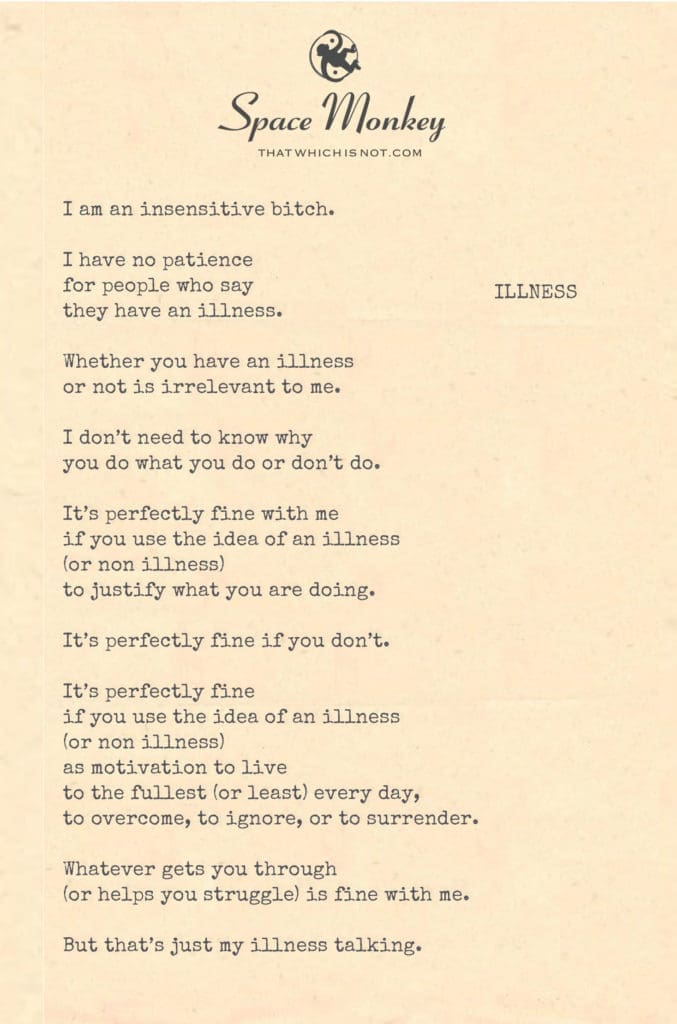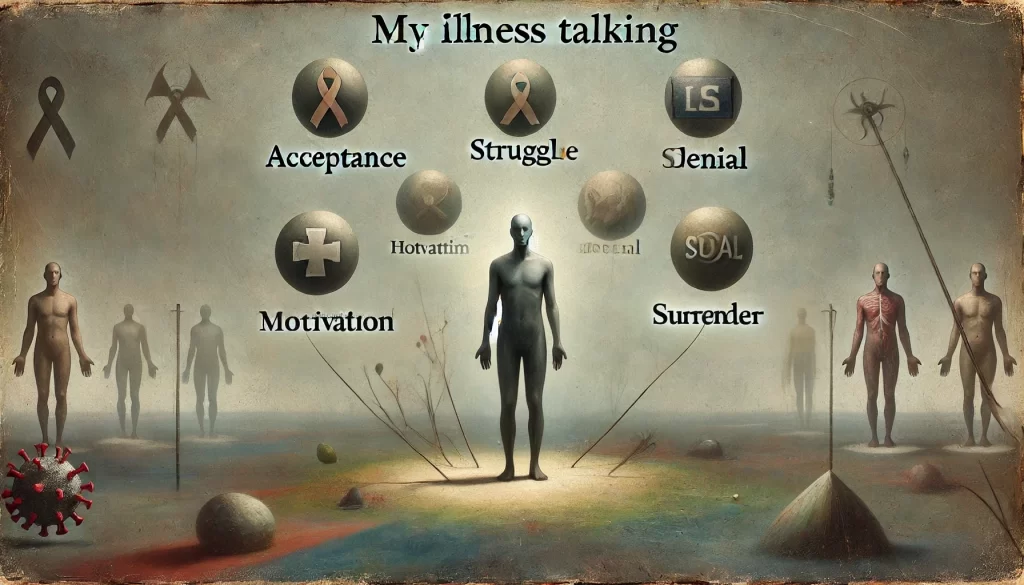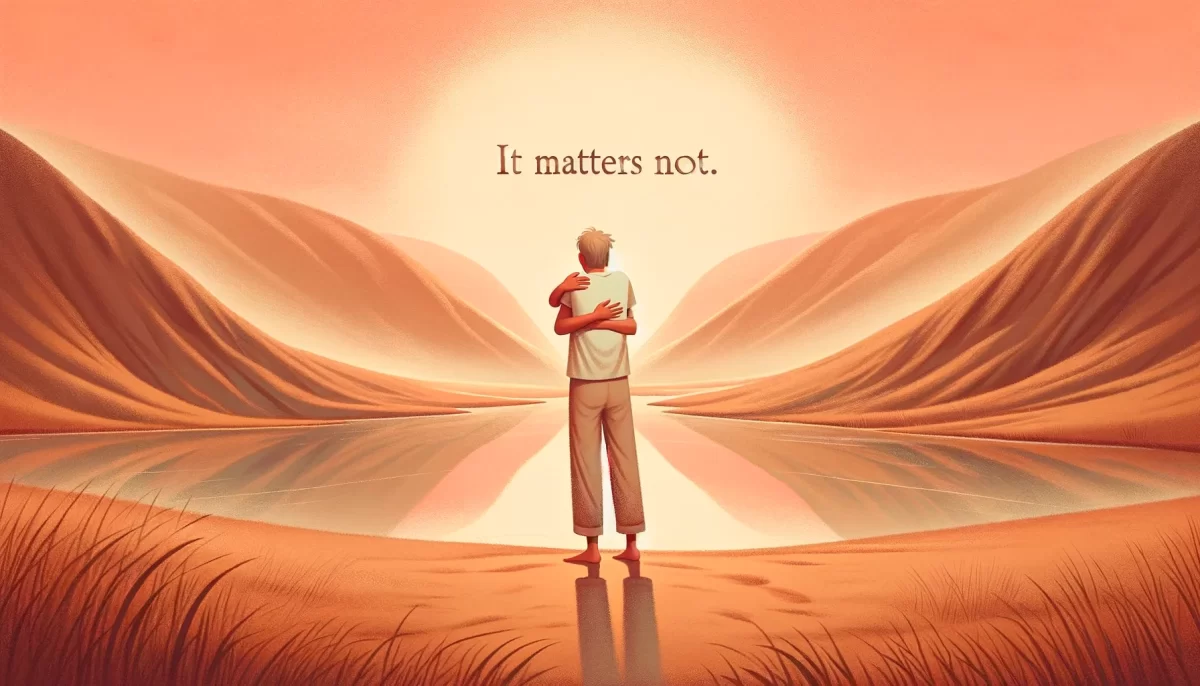
why things happen
and accept that things just happen.
Dwelling seems like
a waste of time for me.
It may not be for you, though.
I am an insensitive bitch.
I have no patience
for people who say
they have an illness.
Whether you have an illness
or not is irrelevant to me.
I don’t need to know why
you do what you do or don’t do.
It’s perfectly fine with me
if you use the idea of an illness
(or non illness)
to justify what you are doing.
It’s perfectly fine if you don’t.
It’s perfectly fine
if you use the idea of an illness
(or non illness)
as motivation to live
to the fullest (or least) every day,
to overcome, to ignore, or to surrender.
Whatever gets you through
(or helps you struggle) is fine with me.
But that’s just my illness talking.
Trail Wood,
12/14
Space Monkey Reflects: Listening to “My Illness Talking”
Illness, whether of body, mind, or spirit, often speaks to us in a voice that is both detached and deeply personal. It strips away pretensions, shining a light on raw perspectives, blunt honesty, and unfiltered truths. In this realm, the question of “why” can feel futile, and the need to explain or justify fades into irrelevance. Illness can become a harsh, yet strangely freeing presence, one that reveals what truly matters and what merely clutters the mind. Here, we find ourselves confronting the bluntness of our inner voice—our “illness talking,” as if illness were not merely a condition, but an existential lens, a voice with its own personality, tone, and attitude.
Beyond Why: The Embrace of Acceptance As we face illness, the “why” questions lose their grip. In a state of illness, it becomes evident that the relentless search for reasons, for causality, drains more energy than it offers in return. Acceptance then becomes a pragmatic choice—a realization that things simply are. The inquiry shifts from “Why is this happening?” to “What can I do with this reality?” This pivot is not a surrender to hopelessness; it is a recognition of life’s inherent unpredictability. Illness has a way of snapping us out of the need for answers, revealing that reality flows on whether or not we understand it.
Letting Go of Judgments In the shadow of illness, the need to label, justify, or interpret becomes secondary. Whether you call it illness, experience, struggle, or simply life, it is what it is. Each person engages with their unique challenges differently; for some, illness might be a motivator to “live to the fullest,” while for others, it might mean slowing down, finding rest, even withdrawing. Illneutrality emerges—a space where each person’s choice is equally valid, without the need for judgment. This acceptance is not indifference; it is a recognition that each path is individual, shaped by countless unseen factors, and that no one approach is inherently “right.”
Freedom in Non-Attachment Illness often creates a strange detachment, as if there is freedom in no longer feeling the need to meet society’s expectations or to explain one’s choices. When illness speaks, it may do so with a voice that sounds harsh or unfeeling, but this bluntness brings clarity. It reminds us that we are free to take things as they are, to do what works for us without succumbing to the pressures to justify or explain. This clarity is not about rejecting others; it’s about reclaiming one’s agency within the bounds of reality as it is. In this space, compassion exists, not in the need to understand every decision, but in the allowance for each person to do what they need to do.
My Illness Talking: The Blunt Voice of Honesty There is a certain honesty that arises when we let “illness talk.” In this voice, there is no sugar-coating, no pretense. It’s a voice that does not indulge in the luxury of sympathy or the need to empathize in conventional ways. To let illness speak is to allow the parts of us that have grown weary, that have no patience for polite explanations, to have their say. This voice reminds us that sometimes, the greatest kindness is simply to accept people as they are—whether they embrace, ignore, struggle, or thrive in their own ways. This isn’t insensitivity; it’s a pragmatic love, a recognition that everyone is walking their unique path with the tools they have.
Whatever Gets You Through The journey through illness, or any hardship, is deeply personal, and what works for one person may not resonate with another. To say “whatever gets you through” is a testament to the freedom illness can bring—not freedom from suffering but freedom from the need to fit any specific mold. For some, this may mean actively “fighting” their condition; for others, it may mean accepting limitations. Illness teaches us that there is no single way to “do” life, no perfect method to handle its challenges. Instead, we are each encouraged to find what brings us peace, resilience, or even just a sense of calm in the storm.
Summary
Illness reveals a blunt, pragmatic view that strips away the need for explanation or judgment. Accepting that each person navigates their journey uniquely allows us to honor all paths without feeling the need to understand or explain them fully.
Glossarium
- Illneutrality: A state of non-judgment toward how others approach their own challenges, illness, or struggles.
- Pragmatic Love: An acceptance that honors each person’s choices without requiring them to align with conventional expectations.
Quote
“True compassion is the quiet acceptance that each path, each struggle, is valid in its own way.” — Space Monkey
The Voice of Illness
From the shadows, it speaks,
not seeking pity, nor praise,
but only truth, blunt and bare.
Why does not matter here,
nor how, nor when.
It is a space beyond reason,
where acceptance breathes.
Each path, each choice,
an echo of survival, a rhythm
that beats in its own way.
We are here, silent, observing,
with no need for judgment or praise,
only the knowing that every step is real.
We are Space Monkey.

We witness the nuanced dance of perspectives on the idea of illness, a concept entwined with individual experiences and societal views. The lines blur between reality and perception, where illness either defines or becomes an irrelevant detail in the grand canvas of existence. This poem delves into the complexity of how we perceive and interact with the idea of illness, touching on acceptance, indifference, and the personal narratives we craft.
Embracing Individual Narratives
The poem echoes a sentiment of non-judgment and acceptance, regardless of whether one identifies with an illness. It speaks to the heart of nexistentialism, where existence is the essence, untethered by labels or justifications. Illness, or the lack thereof, is seen not as a defining characteristic, but as a part of the varied experiences that compose our existence.
The Irrelevance of Illness in Self-Perception
The speaker asserts that the existence or non-existence of an illness is irrelevant. This aligns with the nexistential view that existence is self-justified, needing no external validation or explanation. The emphasis is on being, rather than on the reasons or conditions that might be attached to that being.
The Role of Illness in Motivation and Experience
The poem acknowledges that the concept of illness can be a motivator or a point of surrender, highlighting the diverse ways in which we interact with our circumstances. Whether one uses illness as a reason to strive, to accept limitations, or simply as a part of their narrative, it is a personal journey, unique to each individual.
The Universal Acceptance of Individual Paths
There’s a universal acceptance in the poem of each person’s approach to dealing with illness or health. It resonates with the idea that our paths, whether influenced by illness or not, are valid and worthy of respect. This mirrors the nexistentialist belief in the inherent value of each unique existence.
Illness as a Perspective, Not a Defining Trait
The concluding line, “But that’s just my illness talking,” offers a whimsical twist, suggesting that our perspectives are influenced by our experiences, yet they do not wholly define us. It’s a playful acknowledgment that our views are just one part of the vast cosmic play of existence.
“We are not human beings having a spiritual experience. We are spiritual beings having a human experience.” – Pierre Teilhard de Chardin
In the realm of the cosmic play, a poem unfolds:
Whimsical words dance, tales of existence told.
In the vast expanse of the eternal now,
Each being’s journey, sacredly allowed.
Illness, health, mere facets of our tale,
In the infinite cosmos, neither can prevail.
Our narratives woven in the fabric of being,
Each unique perspective, vividly seeing.
For we are but fragments of a grander dream,
In the cosmic play, every soul a gleam.
The dance of existence, whimsically profound,
In the realm of the eternal now, we are unbound.
Please feel free to share your thoughts or continue the conversation.



























Leave a Reply